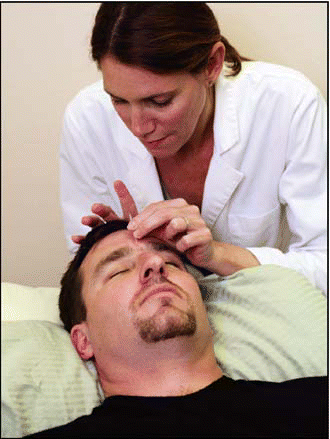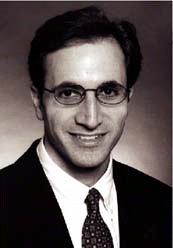Patients with head and neck cancer treated with surgery and/or radiation often experience pain, shoulder dysfunction, and xerostomia. Standard treatments for these adverse effects have been disappointing, but preliminary results of a randomized trial suggest that head and neck cancer patients with these treatment-related symptoms may derive benefit from acupuncture.
Explore This Issue
September 2008Although further study is needed, this trial suggests a potential role for acupuncture in addressing post-dissection pain and dysfunction as well as xerostomia, said David G. Pfister, MD, Chief of the Head and Neck Medical Oncology Service at Memorial Sloan-Kettering Cancer Center in New York. Dr. Pfister presented this study at the 2008 Annual Meeting of the American Society of Clinical Oncology in June. The study received no industry funding.
This study adds to a large body of evidence for acupuncture in the management of pain in general and to other studies showing that acupuncture is superior to sham acupuncture for management of neck and shoulder pain in other settings. The usual approaches to post-dissection neck and shoulder pain and dysfunction in cancer patients are often disappointing or incomplete in their effectiveness. Acupuncture has a favorable side-effect profile, and you can generally tell whether a patient is responding after four treatments. The available data support offering acupuncture as an option to patients who experience post head and neck dissection pain, Dr. Pfister stated.

Dr. Pfister noted that improvement in neck and shoulder pain and dysfunction was the primary endpoint of the randomized trial; xerostomia was a secondary endpoint. The results regarding improvement in xerostomia should, therefore, be interpreted more cautiously. The data for acupuncture and xerostomia are less evolved in this and other studies. However, the results showing improvement in xerostomia are of great interest. We plan to evaluate acupuncture for dry mouth in a randomized trial, he stated.
Ongoing and future research will attempt to characterize better how acupuncture exerts its beneficial effects for these symptoms and to determine which patients are most likely to derive benefit. Corollary studies, including nerve conduction studies, electromyelograms, and functional magnetic resonance imaging studies should be helpful in this regard.
Uses of Acupuncture
Acupuncture is used as an adjunct to anesthesia, to control postoperative pain, and to speed recovery from side effects due to various treatments, including nausea and vomiting associated with chemotherapy. Use of acupuncture can reduce reliance on medications and their attendant side effects.
Acupuncture, which has been used for thousands of years in China and elsewhere in Asia, entails the placement of very thin needles at various stimulation points in the body; sometimes these needles are combined with moxibustion (local heating of herbs), but this was not done in the current study. Dr. Pfister said that in this study, acupuncture was provided by licensed practitioners from the Integrative Medicine Service at Memorial Sloan-Kettering, and he added that it is always advisable to use a licensed practitioner for acupuncture. The main licensing agency is the National Certification Commission for Acupuncture and Oriental Medicine (NCCAOM).
Study Details
The study enrolled 70 patients with treatment-related pain or dysfunction, as reflected by a Constant-Murley Shoulder Outcome Score (CMS) <70. All patients had a greater than three-month interval between surgery/radiation and study entry. Median age of patients was 59 years, and 63% were men. Modified radical neck dissection was performed in 83%, and 60% had squamous cell carcinoma.
 Dealing with the toxicities of cancer treatments is as important [for patients] as treating the underlying cancer. We need to pay as much attention to toxicities as to the treatment itself. This study underscores the shift in direction toward paying closer attention to symptom control.
Dealing with the toxicities of cancer treatments is as important [for patients] as treating the underlying cancer. We need to pay as much attention to toxicities as to the treatment itself. This study underscores the shift in direction toward paying closer attention to symptom control.-Barbara Murphy, MD
The primary endpoint was pain or dysfunction measured by the CMS. This instrument, which is commonly used to assess shoulder function, goes up to 100 points, with higher scores reflecting increased function. The secondary endpoint was xerostomia relief, as measured by the Xerostomia Inventory, an 11-item summation rating scale normalized to a 0-100 point scale in this trial, with lower values meaning better results.
The four-week study randomized 34 patients to weekly acupuncture, and 36 to usual care (the control arm, which included pain medications, anti-inflammatory medications, and physical therapy when indicated). Patients treated with acupuncture received needles at specific acupoints: two in the hand, one in the leg, one in the ear, and one in the hairline, as well as needles placed at other sites according to the patient’s symptoms.
At baseline, the mean CMS was 41.9 in the acupuncture arm and 48.1 in controls. Efficacy data were reported for 58 of 70 patients. After four weeks of treatment, the mean difference between the two groups was 11.2 points, favoring the acupuncture group. Thirty-nine percent of patients treated with acupuncture reported at least a 33% improvement in pain and shoulder function, compared with 7% of controls. Patients in the acupuncture arm also reported a significantly greater improvement in xerostomia, with a difference of 5.8 points on the Xerostomia Inventory favoring the acupuncture group.
 Acupuncture has a favorable side-effect profile, and you can generally tell whether a patient is responding after four treatments. The available data support offering acupuncture as an option to patients who experience post head and neck dissection pain.
Acupuncture has a favorable side-effect profile, and you can generally tell whether a patient is responding after four treatments. The available data support offering acupuncture as an option to patients who experience post head and neck dissection pain.-David Pfister, MD
Important Area of Research
Acute and late toxicities related to treatment of head and neck cancer are an important area of research, according to Barbara Murphy, MD, Director of the Cancer Supportive Care Program and Director of the Head and Neck Research Program at Vanderbilt-Ingram Cancer Center in Nashville, TN.
Head and neck cancer patients suffer the most severe acute and long-term treatment-related toxicities of any cancer, with the exception of stem-cell transplant, she said. Acute toxicities, which are largely due to inflammation, include mucositis and sequelae of pain, dysphagia, and altered voice; radiation-induced dermatitis; and xerostomia and its sequelae. Late toxicities include fibrosis with associated decreased range of motion and swelling in the neck and shoulders (lymphedema). In addition, xerostomia leads to compromised oral health, dental decay, tooth extraction, and osteonecrosis.
Dealing with the toxicities of cancer treatments is as important [for patients] as treating the underlying cancer. We need to pay as much attention to toxicities as to the treatment itself. This study underscores the shift in direction toward paying closer attention to symptom control, Dr. Murphy stated.
Another take-away message from Dr. Pfister’s study is that acupuncture itself can be helpful in alleviating treatment-related toxicities. This study adds to a growing body of literature that would indicate that acupuncture is helpful in head and neck cancer patients, she said.
 It could be that the neuropathic pain associated with surgery and radiation would benefit from acupuncture, but it is less clear whether edema, fluid collection, and fibrosis after surgery and radiation would be helped by acupuncture.
It could be that the neuropathic pain associated with surgery and radiation would benefit from acupuncture, but it is less clear whether edema, fluid collection, and fibrosis after surgery and radiation would be helped by acupuncture.-Robert L. Ferris, MD, PhD
The mechanism by which acupuncture exerts its effects is not well understood, nor are the exact side effects for which it can be helpful. However, studies to address these issues are ongoing.
Definitive studies in a larger patient population are required in order to advocate acupuncture as standard of care for treatment-related symptoms in cancer patents. These studies could be used to support reimbursement, Dr. Murphy stated.
Success Story
In one sense, the fact that supportive care is becoming an important issue reflects success of therapies, with more patients with head and neck cancer being cured or living longer, said Robert L. Ferris, MD, PhD, who is Associate Professor and Vice-Chair for Clinical Operations, as well as Chief of the Division of Head and Neck Surgery in the Department of Otolaryngology and of Immunology at the University of Pittsburgh Cancer Institute.
Dr. Ferris praised Dr. Pfister for presenting a well-designed study and said that he believes that acupuncture could be helpful for a subset of patients, although it is not clear from this study which patients would derive benefit. It could be that the neuropathic pain associated with surgery and radiation would benefit from acupuncture, but it is less clear whether edema, fluid collection, and fibrosis after surgery and radiation would be helped by acupuncture, he commented.
Dr. Ferris is not sure that he would make a general recommendation for patients with treatment-related toxicity to undergo acupuncture. One of his concerns is the expertise of the practitioner delivering acupuncture. Perhaps acupuncture is like medicine, where a specialist would be preferable to a generalist, and it would be better to see someone who treats a lot of head and neck cancer patients with acupuncture, he said.
©2008 The Triological Society
Leave a Reply